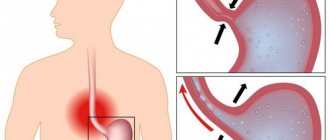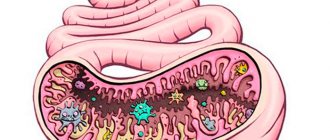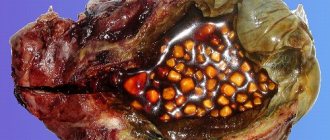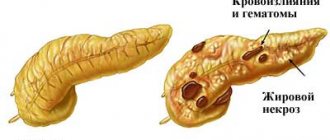Nausea and belching are physiological phenomena of the body after eating food. Individually, they are not symptoms of a pathogenic process in the body. The presence of pathology is indicated by the frequent occurrence of these symptoms together.
The reasons for the unpleasant consequences are as follows:
- Eating fatty foods.
- Diseases of the gastrointestinal tract.
- Intoxication of the body. When intoxicated, poisoning occurs with harmful substances – toxins.
- Disruption of the nervous system.
- Bad habits. Alcohol and smoking have a detrimental effect on the body, which causes nausea.
- Dietary disorder. When a person has no sense of proportion in eating, this leads to diseases of the endocrine system. Prolonged hunger has no less detrimental effects on the body. The stomach constantly produces secretions necessary for digesting food. In its absence, it has an adverse effect on the mucous membrane of the organ.
If malaise appears at different times of the day without eating, this indicates the presence of pathogenic processes in the body.
Poor nutrition
In older people, the stomach loses its ability to digest certain foods, such as dairy products. Food begins to ferment in the stomach, causing belching of air and mild nausea.
A healthy person experiences nausea and frequent belching after consuming certain foods:
- Strong coffee consumed on an empty stomach.
- Alcohol products.
- Sour food.
- Mushroom dishes.
Junk food provokes illness due to a lack of enzymes or individual intolerance to certain foods. In this case, unpleasant consequences may go away on their own.
The occurrence of unpleasant consequences is facilitated by a disrupted diet: overeating, eating late in the day, fasting, consuming food hot or cold. An increase in temperature in the stomach destroys its beneficial bacteria, which affects the process of digesting food.
How to relieve pain on your own?
If headache and nausea occur as a result of poisoning, take Smecta, Polysorb, activated carbon. The use of NSAIDs is not recommended, since poisoning negatively affects the absorption of substances in the stomach. It is necessary to induce vomiting to cleanse the intestines of harmful substances.
In case of any poisoning - food or drugs - gastric lavage is required with a weak solution of potassium permanganate.
Stomach flu in a mild form usually goes away on its own, but if the temperature rises or there is diarrhea, you need to take activated charcoal or Regidron solution. Too frequent stools are eliminated with Enterofuril and Furazolidone. In order not to aggravate the condition, you should not eat fermented milk and dairy products - they contribute to fermentation in the abdominal cavity.
Resorption of sour fruits will help reduce toxicosis and eliminate the gag reflex. Fatty, fried foods should be replaced with steamed foods. You should eat in small portions, 5 times a day. In the morning you can eat a piece of bread, cookies, or drink a mint drink. It is advisable to use Valerian and Cerucal as antiemetics. Relieving migraines is not so easy, because it is not advisable to use medications during pregnancy. An alternative would be strong, sweet tea, a compress with cabbage leaves, a massage with rubbing the active points and applying menthol or lavender oil to them, and breathing exercises.
Infusions of lemon balm, motherwort, juniper, and peppermint will help lower blood pressure.
It is useful to drink water with honey and lemon. Hawthorn is very effective; its branches and flowers are used for treatment. The berries of chokeberry, currant, lingonberry, and blueberry have a therapeutic effect.
Diseases of the gastrointestinal tract
Nausea and belching after eating may indicate the presence of pathology. This sign accompanies:
- Pathogenic processes in the esophagus.
- Stomach diseases.
- Inflammation of the mucous membranes of the gastrointestinal tract.
- Diseases of the duodenum.
These symptoms may occur with the development of diseases of the digestive system:
- Cholecystitis.
- Pancreatitis.
- Biliary dyskinesia.
- Cirrhosis of the liver.
- Oncology.
- Polycystic disease.
- Thyroid diseases.
- Presence of parasites.
Pathology develops under the influence of the following factors:
- Unhealthy eating.
- Penetration of pathogenic microflora.
- Viral diseases (sore throat, flu, tonsillitis, etc.).
Symptoms of the disease
In addition to feeling unwell after eating, the disease is accompanied by the following symptoms:
- Heartburn.
- Loss of appetite.
- Diarrhea.
- Pain in the epigastric region.
- Bad breath.
- Vomit.
- Dizziness.
- Weakness.
- Body temperature rises.
- Belching is accompanied by food particles.
- Constant nausea, in some cases accompanied by vomiting.
- Profuse drooling.
In the morning the symptoms are more pronounced than in the afternoon or evening.
If you notice the above symptoms, you should consult a therapist. Treatment is prescribed after examination and diagnosis. The examination includes palpation in the epigastrium, fibrogastroscopy, fibrogastroduodenoscopy, and radiography.
Such manifestations may be signs of the development of oncology; in this situation, abdominal pain, especially in the upper part, nausea with vomiting and aversion to meat are added to the symptoms.
Lack of timely treatment leads to death.
Treatment
Belching with nausea can be treated traditionally. For this purpose, complex treatment using medications is used:
- To stimulate motor skills. They eliminate spasms by blocking the formation of food lumps in the stomach. Prescribed for weak gastric peristalsis and chronic gastritis.
- Enzymes. Used to improve digestion. Prescribed for inflammation of the pancreas.
- Enveloping antacid drugs. They are used for diseases accompanied by heartburn, as well as inflammation of the mucous membranes of the stomach.
- Means for normalizing intestinal function.
- Choleretic drugs. Prescribed for chronic non-calculous cholecystitis to eliminate bile stagnation.
- Antiemetic drugs. These drugs relieve the nausea symptom and eliminate belching by acting on the brain receptors responsible for the urge to vomit.
An integral part of the treatment of diseases with these symptoms is dietary nutrition. Harmful foods (fatty foods, carbonated drinks, alcohol, spicy foods) are completely excluded from the diet.
Meals should be balanced and fractional. Hunger and overeating negatively affect the functioning of the abdominal organs.
Empty belching after eating, not accompanied by nausea, is a normal physiological phenomenon and does not require treatment.
If nausea is accompanied by severe vomiting and intestinal disorders, stomach flu (rotavirus) is possible. This condition threatens dehydration. If these symptoms appear, you should immediately consult a doctor.
Deviations from the norm
An abnormal decrease in acidity, weakening the pylorus, causes overload of the duodenum, its secretion is not sufficiently supplied in the excess volume of food. This leads to stagnation and decomposition of food, inflammatory processes of the mucous membranes. A weakened pylorus is unable to retain the contents of the small intestine: a backflow of food, bile and duodenal juice occurs, giving the belching a bitter taste.
An abnormal increase in acidity “holds” the food mass in the stomach, first causing increased peristalsis and even expansion, and then atony - a sharp weakening of the gastric muscles. The gatekeeper becomes the main obstacle to the further movement of the food bolus.
Often the cause of atony is prolapse of the stomach. It also sharply slows down the movement of gastric contents along the gastrointestinal tract: the food mass undergoes putrefactive decay and causes severe poisoning, the most striking symptom of which is nausea. In addition, the dilated stomach puts pressure on the nerve plexuses of the abdominal cavity, which regulate the functions of the entire gastrointestinal tract.
Nausea due to nervous disorders
If the nausea symptom is accompanied by dizziness and headache, this indicates a nervous disorder. This happens with head injuries and pathogenic processes in the brain.
The presence of these manifestations suggests that neurosis covers a large part of the brain and upsets the autonomic function of the body. The patient feels unwell for several days. This affects the physical and emotional state of a person. He becomes irritable and tired. The body spends all its efforts to maintain vital functions, working in a stressful mode, which causes the above symptoms.
The nausea symptom is caused during phobias and panic attacks. This is a sign of a mental disorder. Malaise is a reaction to increased psychological stress. This affects the general condition of the patient. His heartbeat quickens, his blood pressure increases or decreases, sweating increases, and stiffness of movements may appear.
Nausea in this case increases gradually. First, the nerve centers are activated. The brain receives a signal about the onset of danger, after which the body directs efforts to fight the source of danger. There is a decrease in appetite. Having received an alarm signal, the organs of the gastrointestinal tract, instead of digesting food, free the body from it. This is due to the cessation of enzyme flow. After loss of appetite, a signal is sent to the brain that blocks the neurohumoral centers that are responsible for increasing appetite.
Drug treatment in such a situation will not bring results. The patient is prescribed a consultation with a psychiatrist, psychologist, or neurologist. Based on the survey results, sedatives, relaxation and other methods of calming are prescribed.
Causes of nausea in stressful situations
There are four factors that provoke nausea in stressful situations:
- Aerophagia. When stressed, the heart rate and breathing reflexively increase. The air enters mainly through the mouth, entering the esophagus and stomach. The accumulated air exits through the esophagus. The result is severe belching.
- Hypertonicity of skeletal muscles. Skeletal muscles are very tense with increased anxiety. Adrenaline is produced, the muscles become stiff, the tone spreads to the internal organs, and the victim suffers from mild nausea.
- Psychological stress. When the load increases, the body gets rid of food for the purpose of relief. Frequent urination and intestinal upset are added to the unpleasant symptoms.
- The patient's mood to vomit. If a person previously reacted to a stressful situation by vomiting, he expects it to appear again. What gives the brain the necessary signal.
If belching air is tormenting, the reasons for its occurrence cannot but worry. Belching is the uncontrolled release of excess gas-air mixture from the internal organs of the gastrointestinal tract through the mouth. Often this process is accompanied by unpleasant sounds. This occurs due to the involuntary movement of the stomach muscles when the sphincter is open, separating it from the esophagus.
We constantly encounter this method of utilizing excess gas in the gastrointestinal tract from the moment of birth. Babies, not yet able to control themselves, during feeding swallow too much air, which is also removed through belching. With age, most people get rid of this.
If the gastrointestinal tract functions normally, then no excess gas will form in the digestive system.
That small amount of air that we swallow while eating is quietly released in small doses that a person usually does not even notice. In a healthy person, belching of air occurs quite rarely and in most cases is odorless.
It follows that burping air has a dual character:
- physiological;
- pathological.
Green therapy
We must understand that folk remedies cannot relieve nausea caused by serious chronic diseases that require long-term systemic treatment. They can only temporarily stop the urge to vomit without eliminating their causes.
Sage and chamomile are excellent herbal antiseptics. Infusions based on them have a disinfecting effect and gently suppress the activity of pathogenic flora in the intestines and inhibit the processes of putrefaction in the stomach. Dry raw materials must be infused for at least 2 hours.
Etiology of the symptom
When belching appears, the reasons for its occurrence are different. Like the causes, the treatment will also vary. As practice shows, most cases of belching occur for physiological reasons in people with a completely healthy gastrointestinal tract. Usually this is an empty belch of air, sometimes accompanied by the smell of food eaten the day before. There may be several reasons for frequent belching:
- Heated conversations that accompany eating.
- Hasty swallowing of unchewed food.
- Persistent emotional tension during meals.
- Aerophagia. Frequent belching of air, which occurs if a person constantly swallows too much air.
- Binge eating.
- Reading while eating, which distracts attention from chewing food.
Very often, belching after eating is directly related to the food itself. Food varies, but some foods have such an unpleasant property as an increased ability to stimulate gas formation. The air in the stomach will tend to come out. Similar products include:
- Carbonated drinks.
- Oxygen cocktails.
- Milk and its derivatives.
- Some types of plants such as onions.
- Many types of legumes and cabbage, which, however, much more often contribute to the development of flatulence.
Despite the apparent harmlessness of the possible causes, severe belching, and even more so frequent, may well be a manifestation of a fairly serious disease. Constant belching of air is one of the manifestations of stomach cancer.
The basis for the formation of pathological belching is various diseases of the digestive system.
- pancreatitis;
- gastritis;
- gallbladder diseases;
- gastroduodenitis;
- hiatal hernia;
- stomach ulcer.
Belching with gastritis, pancreatitis or other diseases listed above is one of the main symptoms, and if it occurs, you should consult a doctor as soon as possible. If you are experiencing belching with a feeling of fullness in your stomach, you should immediately get checked for cancer.
When there is belching of air after eating, the reasons can also be different. Belching a gas-air mixture after eating, unfortunately, is not always caused by physiological factors. Sometimes this form of belching directly indicates the presence of pathological abnormalities in the digestive system. In addition to the well-known symptom of belching with gastritis, other reasons for this phenomenon may be:
- chronic or acute pancreatitis;
- inflammation of the duodenal bulb;
- functional disorders of the tone and motility of the gallbladder;
- the pancreas has pathologies;
- inflammation of the mucous membrane of the esophagus.
It should be noted that in an adult, not all causes of pathologies are located in the digestive system. Frequently recurring belching is a good reason to consult a doctor.
The body's response to a problem
What are the causes of burping air? The human body reacts in a similar way to the following symptoms:
- regular dietary violations;
- improper behavior at the table during meals;
- neurotic dysfunctions associated with constant swallowing of air;
- the presence of any pathologies.
Constant belching may indicate problems that affect the following organs:
- organs of the gastrointestinal tract;
- organs of the cardiovascular system.
Causes of belching air:
- dysfunction of the lower digestive sphincter due to developing hernia of the diaphragm;
- ulcerative lesions of the duodenum or stomach;
- functional disorders of the stomach of a non-ulcer nature;
- diseases that contribute to the reverse movement of food from the stomach;
- due to pathological lesions of the biliary tract or pancreas.
Treatment methods
The method of treating diseases associated with belching on an empty stomach consists of:
- drug therapy;
- folk remedies;
- preventive measures.
It is possible to get rid of morning belching only if you eliminate the pathological process that causes this phenomenon.
Drug therapy
Depending on the cause of belching and the diagnosis, drug therapy is prescribed, which may include drugs of various spectrums of action.
If the production of enzymes that promote the breakdown of proteins, carbohydrates and fats is weak, the specialist prescribes medications that stimulate their secretion:
If the cause of early belching is excessive release of hydrochloric acid, antacid drugs are used, which are:
- absorbable - mixtures of “Bourget”, “Rennie”, “Tams”;
- non-absorbable - “Almagel Neo”, “Maalox”, “Magalfil”, “Protab”, “Taltsid”, “Topalkan”, “Phosphalugel”;
- local and systemic effects;
- monocomponent – sodium bicarbonate, calcium carbonate, magnesium oxide;
- combined - “Almagel”, “Gastal”, “Gelusil Lak”, “Maalox”, “Taltsid”, Phosphalugel.
Along with medications, it is recommended to use alkaline drinks: “Borjomi”, “Essentuki 4”, “Essentuki 17”, “Luzhanskaya”, “Polyana Kvasova”, “Nabeglavi”, “Dilizhan”, “Smirnovskaya”. Before drinking mineral water, it is recommended to release gases.
It is necessary to adhere to the following diet along with drug treatment:
- it is necessary to limit the consumption of fatty, fried, smoked, salty foods, milk and onions;
- give up carbonated drinks and chewing gum;
- eat in small portions, chew food thoroughly so that the stomach can more easily digest the contents;
- do not drink milkshakes or other cocktails using straws;
- try to eat warm, freshly prepared meals;
- do not talk while eating, so as not to swallow excess air.
To reduce discomfort, you need to exercise regularly or exercise daily. Elementary physical exercise stimulates the gastrointestinal tract, reducing excessive gas formation.
Folk remedies
You can get rid of air belching using traditional medicine if there are no pathological processes in the digestive system.
Useful recipes:
- Drink a drink made from diluted apple bites for a week. Add 2 teaspoons of vinegar to 1 liter of water and drink in small sips during meals.
- Brew 2 tablespoons of devyatsil roots in 1 liter of water. Drink 1 glass of decoction before and after sleep for 7–10 days.
- After eating, eat carrots and/or an apple, you can make a puree or juice from these ingredients.
- Ginger root can be consumed in any form.
- An infusion of cranberries and aloe juice has a beneficial effect on the digestive system. To prepare the infusion, you need to take 100 grams of berries and juice and pour 400-500 g of boiling water. You can add honey or sugar to the drink. Take 1 tablespoon 2-3 times every day for a week.
Four categories of pathology
It is customary to distinguish four categories of this pathology:
- sour belching with food;
- belching air with bitterness;
- belching air with the smell of acetone;
- belching without odor.
All these manifestations are caused by various irritants:
- The gas-air mixture comes out of the mouth noticeably acidic, while the acidity in the stomach is much higher than normal.
- Bitter belching. Uncontrolled release of gases with a bitter taste indicates the penetration of bile into the stomach.
- Belching with the smell of acetone. This indicates a significant amount of undigested food in the stomach or diabetes.
- If the air coming out of the stomach has no odor, then there is a classic case of aerophagia, when a person for some reason swallowed air. In rare cases, this indicates problems with the gastrointestinal tract.
After eating, the belching clearly smells of acid. This phenomenon indicates the following possible diseases:
- First of all, gastritis manifests itself in this way.
- A clearly expressed tendency for food to move down the esophagus in the opposite direction.
- Various ulcerative lesions of the digestive system.
- Possible oncological diseases.
This phenomenon almost always indicates disturbances in the functioning of the gastrointestinal tract. Without identifying the objective causes of such anomalies, treatment will be absolutely useless.
There are a number of manifestations that only a gastroenterologist can explain:
- Strong, periodically recurring sour gas from the mouth. Over time, burped food can taste rotten.
- No appetite.
- Continuous heartburn and excessive salivation.
- Nausea at the slightest overeating.
- There is always a heaviness in the pit of the stomach after eating, sometimes developing into quite severe pain.
- All these signs indicate serious gastroenterological problems.
The diagnosis after a visit to the doctor is unlikely to please you. The presence of a sour taste in burped gas indicates the presence of acid, which is too much for the digestion of food.
If undigested food mistakenly moves in the opposite direction, gastric juice may partially enter the oral cavity through the esophagus. The reverse movement of food through the esophagus may subsequently lead to the degeneration of its tissues.
Belching with bitterness. The feeling of bitterness in the escaping air is in most cases associated with various problems and diseases in the duodenum.
In order to encounter such a manifestation, it is not necessary to have the corresponding disease. In rare cases, this phenomenon does not pose a danger and is not even accompanied by any symptoms, but if it occurs regularly, you should immediately consult a doctor.
Belching with acetone. This symptom often appears in the later stages of diabetes.
Prevention
To avoid belching after eating, nausea and bloating, doctors recommend using universal methods that will prevent many gastrointestinal diseases and improve a person’s general condition:
- no need to overeat;
- you need to eat in a sitting position, and not on the go;
- when eating food, you need to concentrate only on food, and not talk, watch TV or play;
- You should not engage in physical activity or lie down immediately after eating;
- you need to eat only fresh foods;
- reduce the amount of foods containing air in the diet;
- exclude fatty and fried foods.
If you follow these rules, you can reduce discomfort and prevent recurrence of malodorous symptoms.
When a person eats, many processes occur in his body. Belching after eating is considered a natural occurrence. But belching air on an empty stomach should alert the patient, as it may signal serious disorders in the body.
Therapeutic measures
How is belching treated? If such a nuisance does not happen to you often, then there is nothing to worry too much about. Basically, the release of excess gas from the digestive organs does not require special treatment; only minimal nutritional adjustments are necessary. It may make sense to resort to a less restrictive diet.
When gases from the digestive organs bother you quite often, it makes sense to consult a doctor and tell him about all the observed manifestations. If there is cause for concern, the doctor will prescribe additional examination.
How to treat belching depends entirely on its type. A pathological variety requires the cause of its occurrence to be established before treatment.
To eliminate the phenomenon of air belching, treatment must be combined with proper prevention. It is also important to remember some features.
- It is much easier to treat the release of gases through the mouth of a physiological nature.
- There is no need to rush while eating. Food should be chewed more thoroughly.
- Before eating, you should bring your emotional state back to normal and only after that start eating.
- Don't get overtired.
- Eliminate carbonated drinks from your diet as much as possible.
- If possible, you should avoid products that cause this phenomenon. Try to identify them and avoid them in the future.
- Don’t leave the organization of the nutrition process to chance, try to eat well.
- Moderation in food should become your norm.
- Avoid coffee or tea that is too hot;
- Stop the habit of using a straw when drinking.
- Replace chewing gum with other ways to achieve fresh breath.
- Categorical cessation of smoking.
After eating, do some exercise to help digest food better. If you follow these simple rules, then burping probably won’t bother you.
Diagnostics
Any symptom requires examination to make an accurate diagnosis. Since belching is not an independent disease, it is necessary to treat the source that led to the occurrence of the unpleasant symptom. Making a diagnosis and prescribing adequate treatment occurs only after the necessary examination and testing:
- You need to take a blood test. It is mandatory to take blood for biochemical analysis and for detailed analysis.
- An ultrasound scan of all organs responsible for digesting food is performed, and the intestinal tract is examined.
- Gastroscopy.
Having received the answers and diagnostic results, the doctor prescribes a course of treatment and diet.









